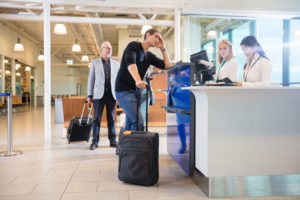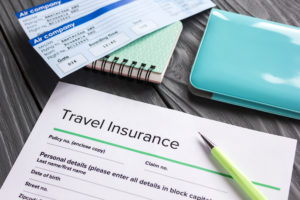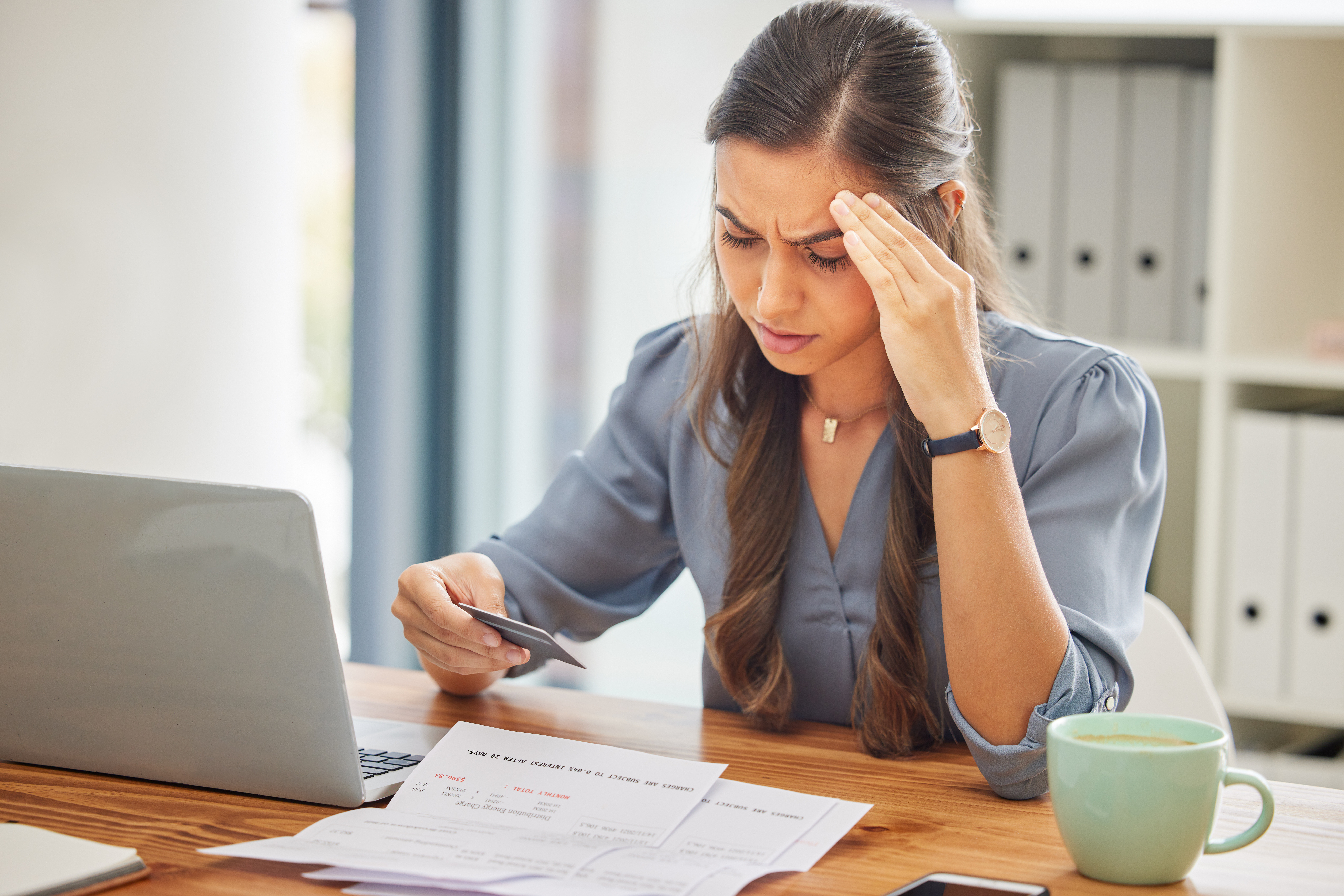
Unlucky break: Will travel insurance protect you when you need it?
Last updated on May 8th, 2025
Australians are big travellers — at least we were before Covid hit. Now that we’re getting back out on the road and into the air again, should we protect our hard-earned money with travel insurance?
Some people might say that travel insurance is a waste of money. After all, what are the chances that something will actually happen to you while you’re on holiday? But the truth is, anything can happen when you’re away from home. And if something does go wrong, travel insurance can be a life saver. But is it really worth the extra expense? And how has Covid changed things?
Travel insurance in a nutshell
Travel insurance is a relatively new concept. The first documented instance of travel insurance dates back to 1864 when James Batterson opened the world’s very first insurance agency for travel called The Traveler’s Insurance Company. The insurance was designed to cover travel-related thefts and accidents.
Today, travel insurance is generally used to protect against unexpected expenses, such as medical bills or lost luggage, as well as cover for trip cancellations and delays. While travel insurance is not required by law, many airlines and tour operators recommend that travellers buy a policy before embarking on their journey.
There are different types of travel insurance and what it covers depends on the type you get.
Basic travel insurance
Most basic travel insurance policies will cover you for things like:
-
- Emergency medical treatment
- General medical assistance
- Patient transport to hospital by helicopter or ambulance
- Medical evacuations back to Australia
- Injuries and accidents, unless it's from an excluded activity, such as skiing
They usually don't cover your property, such as damaged or stolen luggage, or cancellation costs. If they do, the conditions are more restrictive and claim limits are much lower and have a much higher excess than comprehensive policies. See Smarttraveller's full list of what is and isn’t included.
Comprehensive travel insurance

A comprehensive travel insurance policy generally covers:
-
- Medical assistance and emergencies
- Travel cancellation costs and delays
- Lost, damaged or stolen property, typically items such as electronic devices, baggage, cash and jewellery
- Some legal fees – such as lawyer and/or translator costs – if you get into a sticky situation
- Some higher-risk sports and activities
However, the cover comes with these exclusions:
-
- Medical assistance for pre-existing physical and mental health conditions
- For baggage and valuables, it depends on the circumstances. For example, if you lost your jewellery while you were breaking the law or drunk, you may not be able to claim.
- Cancellations or possible problems you were warned about before you bought the policy (for example, conflict in a country, natural disasters and pandemics).
See Smarttraveller's full list of what is and isn’t included.
Credit card travel insurance
If you're planning a trip, you may be using your credit card to pay for some of the expenses. And if your credit card offers travel insurance, that might seem like a no-brainer. After all, why not take advantage of a perk that could save you money?
However, in most cases, it provides only basic protection for medical emergencies, cancellations and problems with your baggage and valuables. Budget Direct has a table outlining how a standalone policy compares with credit card travel insurance. If you're after comprehensive coverage, you might be better off buying a separate travel insurance policy.
Travel insurance is not health insurance
If you have a private health insurance policy, you might think that you don't need travel insurance. After all, your health insurance should cover you no matter where you are in the world, right? Unfortunately, it’s usually only for while you’re in Australia. Travel insurance offers a different kind of cover and it is recommended for anyone planning to travel overseas.
Travel insurance covers things such as missed flights, lost luggage, and cancellations. Health insurance typically does not and when it does, the excess is higher. Travel insurance also offers medical cover for things like accidents and illnesses. It can also provide financial protection in the event that you have to be medically evacuated from your destination in an emergency.
How travel insurance works
Like health insurance, travel insurance is one of those things that you hopefully never have to use, but it's good to have just in case something goes wrong. But with so many different policies on offer, it can be tricky to figure out which one is right for you. Here are some of the main factors that will affect your travel insurance policy:
-
- Where you're going. Different policies will cover different regions, so make sure you're covered for where you're planning to travel. If you're travelling somewhere with a much higher risk of an emergency, your policy will be more expensive.
- How long you're going for. Most policies have a maximum length of time they will cover you for, typically three to twelve months. The longer you're away, the more risks of something happening to you, so the higher the premium.
- What activities you're doing. Many policies will exclude certain activities, such as skiing or motorcycling, so check the small print before you buy.
- Your age and health. Your age and health status can affect both the cost and coverage of your policy. It's important to be honest when filling out the application form, or it could end up costing you big time later.
Can travel insurance be refunded?
You might be able to get a refund if your trip doesn't go ahead and you have a valid reason, such as a natural disaster or accident. Check the terms and conditions of your policy before you buy, as some insurers will only offer a refund if you cancel your trip within the cooling-off period of 21 days. If your cancellation is due to Covid-19, you may be able to get your money back even if it's outside the cooling-off period.
Some policies might also charge a cancellation fee, so it's important to factor this into your decision.
Surprisingly, insolvency is not usually covered; only a few insurers will cover you if your travel provider goes broke overnight – that includes hotels, airlines and other transport companies.
Can travel insurance be bought after departure?
It is possible to buy travel insurance after you've already started your trip, but it will be more expensive and the cover more restricted. Some insurers implement a three-day no-cover period. That's because most policies have a period of time known as the 'look-back' or 'free cover' period. This is the time between when you buy your policy and when your trip starts.

During this period, you're covered for things that happen to you that are out of your control, such as an earthquake or a volcanic eruption. But if you buy your policy after your trip has started, you won't be covered for these types of events.
There are only a few insurers, however, that will sell you cover once you've already departed (look for the 'Have you already left Australia?' checkbox).
The fine print of policies
The small details of travel insurance can be confusing, so it's important to understand what you're covered for before you buy. Make sure you read the product disclosure statement (PDS) before you buy a policy, so you know exactly what you're covered for and what you're not.
The most important points to see and understand are:
-
- Table of benefits
- The policy cover
- General exclusions
- Pre-existing conditions
- Definition of terms
- Claims section
What’s the impact of Covid on travel insurance?
The pandemic has changed the way insurance policies are written, and most insurers have adjusted them to fit to the new travel environment. However, the benefits are restricted, so you must verify what is covered. It's also made premiums higher. According to The Australian Financial Review, travel insurance now costs almost 10 percent more than pre-Covid.
If travelling overseas, note that several countries now require tourists to buy travel insurance that covers medical expenses incurred as a result of the pandemic. Check your PDS to ensure that your policy covers you appropriately or you may be unable to enter certain countries.
Always double-check the entry requirements and the government's travel advice for each destination. Smarttraveller also has a list of countries on its travel advisories. You can see whether your destination is tagged under:
-
- Do not travel
- Reconsider your need to travel
- Exercise a high degree of caution
- Exercise normal safety precautions
For more about travel insurance and Covid-19, read Smarttraveller and CHOICE's buying guide.
How to get a good deal on travel insurance
Travel insurance is a complex and ever-changing product, so it's important to do your research.
Shop around and compare policies
Use an online comparison site to compare policies from a range of insurers, so you can find the right cover at the right price.
Buy early
You only pay for the time you're away, but you are covered from the instant you buy it. For example, if you buy two months before you travel, you may be covered for anything that affects your itinerary.
Pay your premium in full upfront
Usually you will get a discount if you pay for your policy in full, rather than in instalments. Be sure to ask for it before you pay.
Choose a higher excess
The excess is the amount you have to pay towards any claims. If you're willing to pay a higher excess, you will be able to get a policy with a lower premium.
If travelling with someone else, choose a group, couple or family plan
Generally speaking, insurers offer discounts when you have two or more people on the same trip.
Check for any discounts
Some insurers offer loyalty discounts, so if you're an existing customer, it's worth checking to see if you're eligible for a discount. You might also be able to get a discount if you already have other policies with the insurer, such as home and contents insurance.
Make sure you don't over-insure
Don't buy more cover than you need. For example, if you're going backpacking for only a few days, the basic cover will do as you won't have many items with you. If you're less concerned about having medical insurance, you may choose to get luggage insurance only. Check out Finder's list of insurers offering this cover.
Check the policy details carefully
Make sure you understand exactly what you're covered for and what you're not. Read the PDS carefully before you buy.
How travel insurance claims work
When you make a claim, the insurer will reimburse you for any eligible expenses. The amount you receive will depend on the level of cover you have chosen.
Some policies have a 'benefit limit', which is the maximum amount the insurer will pay out for each type of cover. For example, the benefit limit for medical expenses might be $5,000. If your expenses are more than this, you will have to pay the difference yourself.
Some policies also have an 'overall limit', which is the maximum amount the insurer will pay out for all claims combined. For example, the overall limit might be $10,000. This means that even if you have several different types of claims, the insurer will only pay out a maximum of $10,000 in total.
What documentation could be required?
When you make a claim, you will need to provide evidence of your expenses. This might include receipts, invoices or quotes. If you're claiming for lost or stolen items, you will need to provide a police report, obtained preferably within 24 hours of the incident.

For medical claims, you might need to provide a doctor's certificate or hospital discharge summary. You might also need to provide proof of any pre-existing medical conditions if you're claiming for treatment related to these conditions.
For travel delay claims, you will need to provide evidence of the delay, such as a flight itinerary or train timetable.
To make the process easier, be sure to lodge a claim within the time allotted by your insurer. Time limits vary, but generally it’s between 30 and 60 days.
How long do payouts take?
This depends on the insurer and the type of claim. Some claims, such as lost luggage, can be paid out fairly quickly, as long as you let your insurer know as soon as the incident happens. In general, you should get a response from them within 10 days of lodging your claim.
Other claims, such as medical expenses, can take longer as the insurer will need to assess the claim and make sure you are eligible for cover.
If it's an emergency, good insurers almost always have a 24/7 hotline you can contact for immediate assistance. These emergency teams can give hospitals financial guarantees, work with your doctors (particularly useful in a foreign country), arrange medical transfers or evacuations back to Australia, and contact family and friends back home.
How do you contact your travel insurer?
In most cases, you will be able to contact your insurer by phone, email or live chat. Some also have an app that you can use to make a claim or get assistance while you're overseas. Check your insurer's website or the PDS for the specifics.
What could go wrong?
There are a few things that could go wrong when you're dealing with travel insurance. For example, your claim might be rejected because:
-
- You didn't disclose all relevant information to the insurer when you bought the policy
- Your claim is for an exclusion under the policy
- You don't have the necessary documentation to support your claim
- You made your claim outside the policy period
- Your expenses are more than the benefit limit or overall limit on the policy
It could also be that your insurer deliberately misled you. In 2020, for example, the Australian Securities and Investments Commission (ASIC) took action against Allianz Insurance and Allianz Global Assistance (known as AWP) for misleading customers at point of sale.
According to ASIC, "Allianz and/or AWP allowed the sale of insurance to customers who were ineligible to make claims under the policies." This happened when customers booked via a third-party website, Expedia, and they were offered travel insurance upon checkout.
What to do if your claim is rejected
If your claim is rejected, you can ask the insurer to review their decision. If you're not happy with the outcome of the review, you can lodge a complaint with the Australian Financial Complaints Authority (AFCA). It's a free and independent service that can help resolve disputes between consumers and financial services providers.
If you're not happy with the way your insurer is handling your claim, you can make a complaint to them in writing. If you're still not happy with their response, you can take the complaint to the AFCA.
And if you're dissatisfied with the AFCA ruling, legal action against the insurance company may also be worth considering.
But if you don't want the hassle of taking your complaint from one agency to the next, lodge your complaint with us and we'll handle everything for you, all in just a few clicks.






